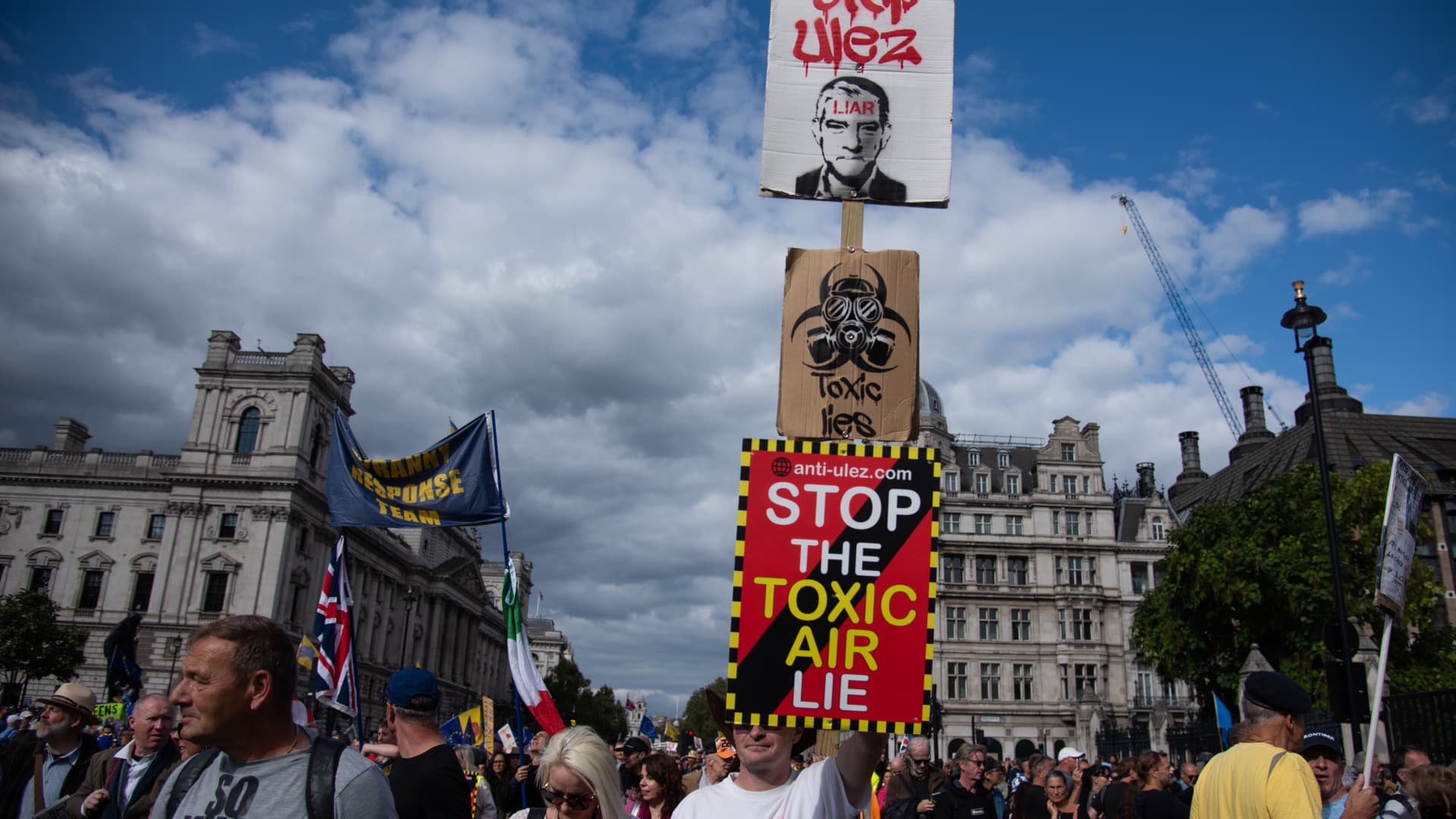
A protestor holds a placards during the ULEZ Protest. Protesters against Ultra Low Emission Zone (ULEZ) expansion brought traffic to a standstill as they demonstrated against the expansion of London’s Ultra Low Emission Zone.
Sopa Images | Lightrocket | Getty Images
MANCHESTER, ENGLAND — Moves by the U.K. government to introduce a series of pro-motorist policies brings Britain into the fold of countries succumbing to a political backlash against Europe’s green agenda.
A so-called “greenlash” has been growing across Europe as the cost of implementing ambitious environmental policies has faced resistance from citizens, prompting some governments to water down their targets.
Britain’s Transport Minister Mark Harper last week announced new concessions for motorists, a move he said would protect drivers from “over-zealous traffic enforcement.”
The measures include limits on councils’ ability to impose speed limits, restrictions on the number of hours a day that car traffic is banned from bus lanes, and a new national system to simplify parking payments.
The decision comes as the ruling Conservative Party seeks to shore up support from voters — many of whom live in rural areas and feel unfairly penalized by green transport policies — ahead of next year’s General Election.
“The Conservative Party is proudly pro-car,” Harper said as the Conservative Party Conference got underway in Manchester, England. “We stand for freedom to travel how you want.”
Seizing on ‘sinister’ green policies
In his speech, Harper called out as “sinister” the idea of 15-minute cities: an urban planning concept where all amenities are accessible within a 15-minute walk or cycle.
Despite being praised for its green credentials and focus on accessibility, the idea was seized upon during the Covid-19 lockdowns by conspiracy theorists who claimed it was part of a plot by governments to control their populations.
“I’m calling time on the misuse of so-called 15-minute cities,” Harper said, noting that local councils should not be able to ration road use, providing no evidence that they currently do so — or, indeed, that they could.
Net zero isn’t something that can be done to people by a political elite.
Claire Coutinho
U.K. Minister for Energy Security and Net Zero
The comments follow an earlier watering down of the U.K.’s green agenda by Prime Minister Rishi Sunak.
Last month, Sunak delayed a ban on the sale of new gasoline and diesel cars, saying that the move would ease the financial burden on households.
Then, on Wednesday, Sunak announced the cancellation of a section of the U.K.’s long-awaited HS2 high-speed rail network, a public transport infrastructure project intended to better connect major cities with the capital. Instead, he said, the funds would be spent on local transport projects, including greater investment in road networks.
The decision was unveiled under Sunak’s election campaign slogan “Long-term decisions for a brighter future” as he sought to reassert his leadership among more radical Tory factions.
Growing European ‘greenlash’
The moves come amid the rising politicization of green policies across Europe and beyond as citizens struggle with a cost-of-living crisis.
Germany last month passed a watered-down version of a contentious heating law, delaying the phaseout of gas boilers by several years.
In the Netherlands, frustration at plans to cut nitrogen pollution led to a shock poll win for a new farmers’ protest party.
Meantime, the governments of France and Belgium have both called for a pause on the European Union’s green legislative agenda.
In London, a recent decision by Labour Mayor Sadiq Khan to expand the city’s Ultra Low Emission Zone (ULEZ) to all boroughs was met by backlash from those who protest the higher fees involved.
Britain’s recently appointed Minister for Energy Security and Net Zero, Claire Coutinho, reiterated the government’s position last week, saying that the public shouldn’t be forced to go green.
“Net zero isn’t something that can be done to people by a political elite,” she said, accusing the opposition Labour Party — currently ahead in the polls — of strong-arming the public into making greener choices.
“They want to force people to behave in a certain way,” she said. “Their plans are toxic and would collapse popular support for net zero.”
